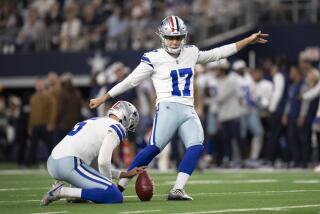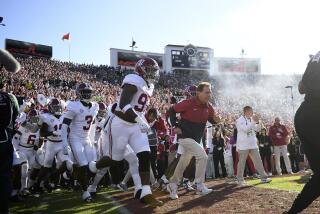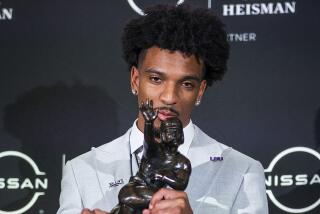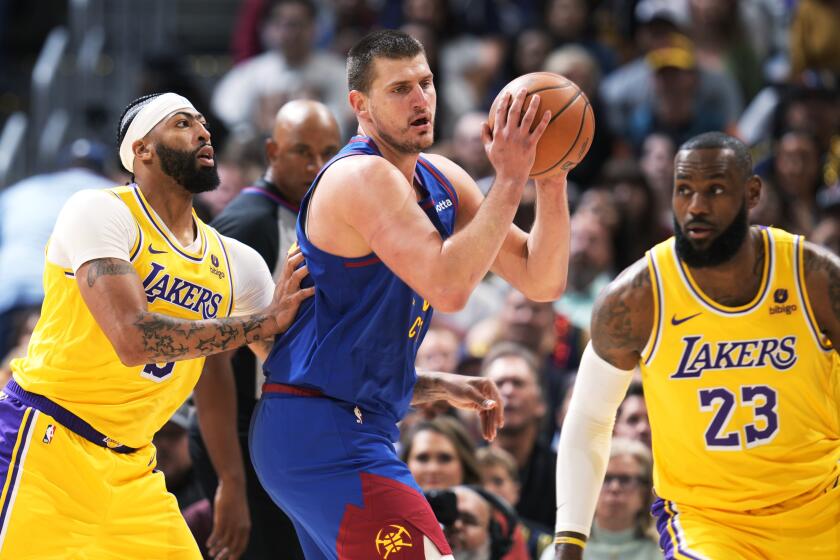Column: Cole Tracy, the kid who wasn’t supposed to play Division I football, just made a dream come true
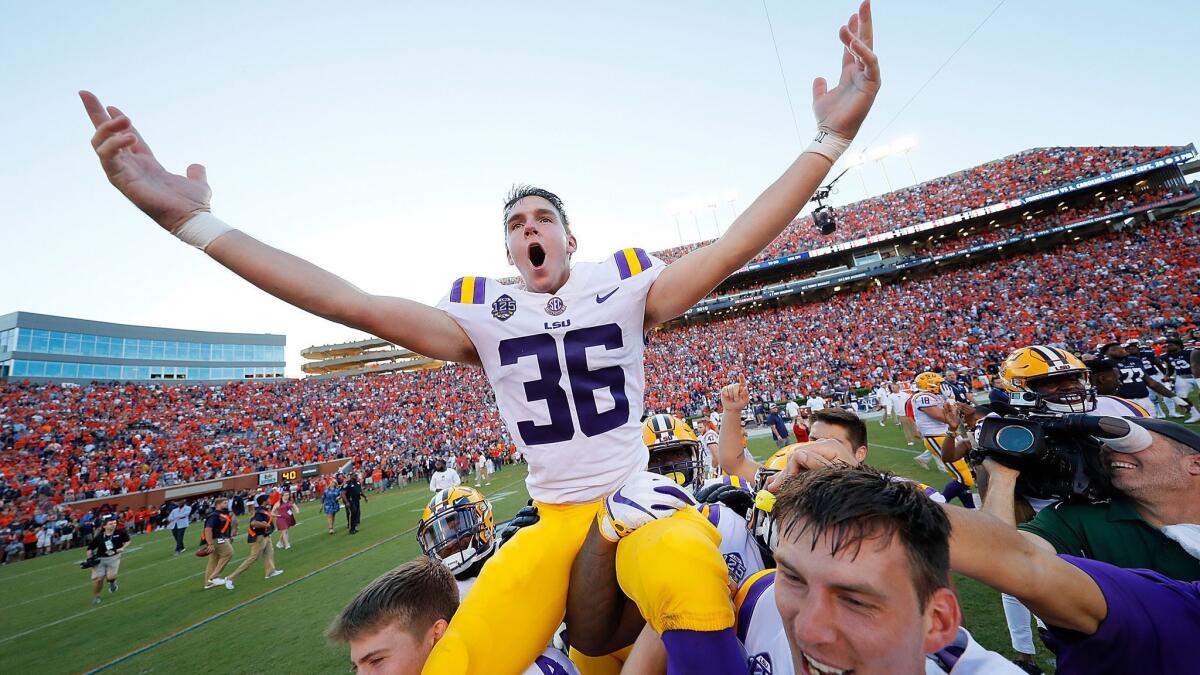
There was no reason to stick around, watching that football spin through the evening sky.
Cole Tracy knew he had kicked it straight as can be, knew it would split the uprights, his 42-yard field goal giving Louisiana State a last-second, 22-21 victory at Auburn.
“I started to run,” he says. “Took off as fast as I could.”
Kickers tend to do that, sprinting away with arms outstretched in celebration; their teammates tend to give chase, knocking them to the turf. A much-larger tight end landed on top of Tracy first and worried about everyone else piling on.
“He used his body as a shield, holding four guys on his back,” Tracy says. “My helmet popped off.”
Just that quickly, this young season had its first Cinderella story.
No major schools offered Tracy a scholarship when he came out of Newbury Park High five years ago. His leg wasn’t quite strong enough, so he landed at tiny Assumption College in Massachusetts, with its field bordered by a grandstand along one sideline and trees beyond the end zone.
It should not have mattered how many hours he spent lifting weights beside massive linemen or how many field goals he made against Division II opponents such as Merrimack or Southern Connecticut State.
Big-time college football seemed a world away.
“A lot of people are really caught up on that,” he says. “I understand the point they’re getting at.”
But last Saturday in the heart of Southeastern Conference madness, with 87,000 fans packed inside Jordan-Hare Stadium, was no miracle. Not by his way of thinking. Somewhere under the jumble of bodies at midfield, Tracy was living a moment that had played through his head a million times.
LSU wasn’t the only team that lined up for a do-or-die kick last week. Missouri also won with a last-second field goal; Wisconsin and Oregon State lost on misses at the end.
“There’s a lot of pressure obviously on that [play],” Missouri coach Barry Odom says. “With no time left, it’s the game.”
The adrenaline can be enticing. Like most kickers, Tracy always has practiced by imagining the score is tied and the clock is ticking down.
Growing up northwest of Los Angeles, he lost interest in youth soccer sometime around middle school. A family friend who had kicked for Air Force took him to a football field and taught him the basics.
“I fell in love with it,” Tracy says.
His father helped him build makeshift goalposts in the backyard, using the long, metal poles from pool skimmers with a rope tied between them as a crossbar. Within a couple of years, he was starting for Newbury Park’s varsity team.
“Cole was always very accurate,” says Chris Sailer, a former UCLA kicker who has long been Tracy’s private coach. “He just wasn’t quite as strong as the top-level guys.”
Washington State brought him to campus for a workout but decided not to offer a scholarship. Other Division I schools invited him to join their teams as a “preferred” walk-on.
That left smaller Division II schools as the next-best option. By the spring of 2014, Tracy simply wanted to go where he felt wanted.
The staff at Assumption had seen film of him in Newbury Park games. When he traveled to Worcester for a visit, Tracy found what he was looking for in then-coach Bob Chesney.
“To be honest, there wasn’t a great history of football,” he recalls. “But that guy absolutely loves kickers.”
At some college programs, kickers stay apart from the rest of the team. Coaches have them follow a specialized regimen, doing specific stretching and strength training.
Assumption took a different approach.
Chesney always has urged his kickers to join the other players in the weight room, sweating and straining beside linebackers and defensive ends.
“Power squats and cleans,” says the coach, who recently left Assumption for a Division I job at Holy Cross. “I want them doing what everyone else is doing.”
Not that Tracy could keep up with the big guys in terms of sheer poundage, but heavy lifting helped him grow stronger so he could kick from longer distances. Chesney had something more in mind, something he mentioned to Tracy on several occasions.
“If you’re going to play an important role on the team, you need to work and be around the team when times are tough,” he told his kicker. “If you miss the winning kick, they’re still going to support you because they understand the work you did.”
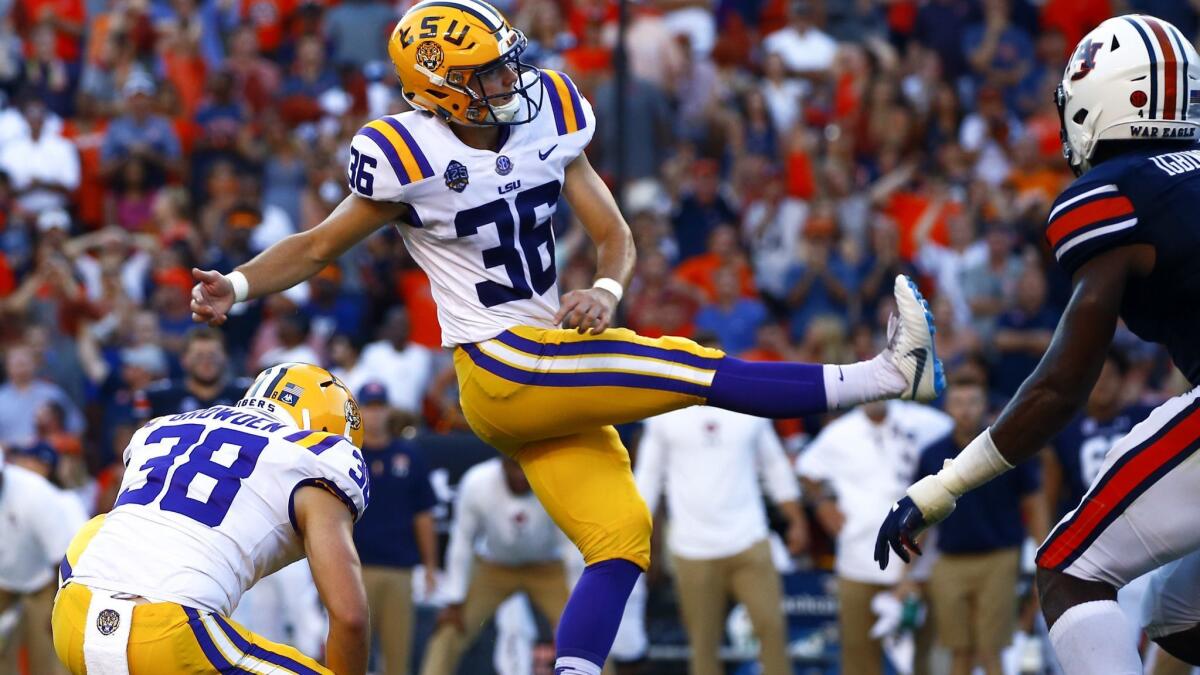
This method made a difference. After redshirting his freshman season, Tracy led Division II kickers in scoring in 2015. The next fall, he tied a record for all of college football with six field goals in a game against St. Anselm.
Last season, he won the Fred Mitchell Award as the top kicker at any level below Division I.
“Strength definitely plays a role because you have the range,” says Sailer, who has continued to coach Tracy each summer. “And when you have the range, you start to believe in yourself and have more confidence.”
But muscle wasn’t the only thing Tracy acquired at Assumption. He also got the gift of time.
When Chesney decided to redshirt him during that first season — the Greyhounds already had a senior All-American kicker — the freshman was upset.
“At the time, I wasn’t for it,” Tracy says. “You want to compete for the job. You want to play right then.”
Whether he liked it or not, waiting paid off. Upon earning his degree last spring, Tracy still had a season of eligibility remaining. He also had a resume to show any Division I teams that might need a quick fix at kicker.
Tracy sat down with Chesney for a talk.
“My coach didn’t hesitate at all,” the player recalls. “He went through all of his contacts and started calling around.”
In 2006, the NCAA modified its rule involving transfers. Any student-athlete who has earned a degree can enroll at another school to pursue graduate studies and, unlike most other transfers, become immediately eligible.
The change has sparked a growing trend in college football, with older players jumping from one campus to the next.
This past offseason, high-impact graduate transfers included UCLA quarterback Wilton Speight, Texas running back Tre Watson and LSU quarterback Joe Burrow.
Tracy added his name to the list.
“We’re excited to see him in camp and see what he can do for us,” LSU coach Ed Orgeron said during the summer.
The Tigers struggled on special teams last season, making only 16 of 27 field-goal attempts. With Tracy as the new starter, things turned around immediately.
In his first game on the big stage, he made four field goals and tied a school record with a 54-yarder as LSU upset Miami at AT&T Stadium in Texas. The next week, he kicked a 50-yarder in a shutout of Southeastern Louisiana.
It had to be a shock, trading the Assumption field for huge stadiums, seeing thousands of screaming fans behind the end zone rather than the calm of all those trees.
Tracy had spent months wondering if the change would rattle him. “I’d be naïve if I didn’t,” he says. But instead of amplifying his nerves, the time to think helped calm him down.
At one point during the Miami game, he recalls turning to his holder and saying: “This is no different.”
The best kickers are creatures of habit. Given the pressure of their job — one chance to do it right — they try to approach every kick the same way.
As the minutes ticked down against Auburn, the Tigers trailing by two points, Tracy knew the game would be decided by a field-goal attempt at the end. He had to fight the urge to start warming up when LSU took possession of the ball on its 24-yard line with 5:38 remaining.
Better to stick to his routine.
The week before, he had scanned highlight films from other games at Jordan-Hare Stadium, familiarizing himself with the visual background at each end of the field. He says: “I wanted to put myself in that situation.”
Only when the Tigers reached midfield did he begin stretching and kicking a few balls into the net. There was still time for mental preparation.
“It’s a whole lot like golf,” he says. “You want to visualize a lot.”
Every kicker has a different personality. Some of the players Sailer coaches are intense from the opening kickoff, always laser-focused on the sideline. Tracy isn’t like that.
His easygoing nature during games, the way he chats and jokes on the bench, can be startling.
“For Cole, it’s a relaxing mechanism,” Sailer says. “You’ve got to be yourself.”
As LSU moved deep into Auburn territory, Tracy’s teammates noticed him laughing about something. Not until he trotted onto the field with two seconds remaining did his demeanor turn utterly serious.
Picking a target — a spot on the scoreboard behind the goalposts — he took a few steps back, then a couple to the left. A dull roar filled the stadium, the home crowd yelling for a miss.
“You’re going to have adrenaline,” he says. “But you don’t want to think about it much.”
A chance to kick the game-winning field goal. On the road. In the SEC. It was a moment he had dreamed about — had worked toward — from the day he set up those goalposts in the backyard.
His brain was turned off, his body taking over. Tracy put his head down and waited for the snap.
Follow @LAtimesWharton on Twitter
More to Read
Get our high school sports newsletter
Prep Rally is devoted to the SoCal high school sports experience, bringing you scores, stories and a behind-the-scenes look at what makes prep sports so popular.
You may occasionally receive promotional content from the Los Angeles Times.

